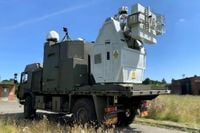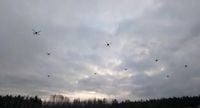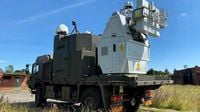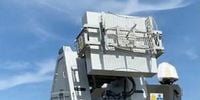In a groundbreaking achievement for military technology, British soldiers have successfully deployed a new radiofrequency weapon to neutralize drone swarms during a series of trials conducted in Wales. This innovative system, known as the Radiofrequency Directed Energy Weapon (RF DEW), marks a significant advancement in the UK's air defense capabilities, demonstrating the potential to counteract one of the most pressing threats in modern warfare.
On April 17, 2025, the British Army conducted its largest counter-drone swarm exercise to date, successfully tracking, targeting, and disabling over 100 drones using the RF DEW. The trials took place at a weapons range in west Wales, where soldiers from the 106 Regiment Royal Artillery operated the system, achieving near-instantaneous results against multiple targets.
The RF DEW operates by emitting high-frequency radio waves that disrupt the internal electronics of drones, causing them to crash or malfunction. This method stands in contrast to traditional missile-based defenses, which can be costly and single-use. With an estimated operating cost of just 10 pence (approximately 13 cents) per shot, the RF DEW provides a cost-effective solution for military bases, airports, and other sensitive locations.
According to the UK Ministry of Defence, the successful trials involved the simultaneous detection, tracking, and neutralization of multiple drones—an impressive feat that underscores the system's capabilities. “This significant experiment exemplifies the strength of British innovation—driven by our home-grown industry, technology firms, and scientific talent,” stated Defence Procurement Minister Maria Eagle MP.
During the trials, the RF DEW was able to effectively disable drone targets at ranges of up to one kilometer, making it particularly useful against drones that are resistant to traditional jamming techniques. However, the current limitations include its inability to distinguish between friendly and enemy drones within its wide beam, which could pose risks of collateral damage.
The development of the RF DEW is part of a broader initiative led by a consortium spearheaded by Thales UK, known as Team Hersa, which collaborates with the Defence Equipment & Support and the Defence Science and Technology Laboratory. To date, the UK government has invested over £40 million in this project, supporting more than 135 skilled jobs across the UK.
Sergeant Mayers, a senior remotely-piloted air systems operator who operated the RF DEW during the trials, remarked, “RF DEW is an exciting concept. We found the demonstrator quick to learn and easy to use. With improvements on range and power, this would be a great asset to layered air defense.” His successful engagement with the drones marks him as the first British soldier to utilize this cutting-edge technology in combat.
The emergence of drone swarms as a significant threat has been highlighted by recent conflicts, particularly in Ukraine, where over 18,000 drone attacks were reported last year alone. UK Defence Intelligence estimates that the rapid evolution of drone warfare necessitates innovative solutions like the RF DEW to safeguard military and civilian targets.
As the UK military continues to adapt to the evolving landscape of warfare, the RF DEW represents a forward-thinking approach to air defense. The trials come at a time when the UK government has pledged to allocate at least 10% of the Ministry of Defence's equipment procurement budget to novel technologies from 2025-26, ensuring that the military remains equipped to face emerging threats.
In addition to its potential applications for military operations, the RF DEW could also play a crucial role in protecting sensitive areas from unauthorized drone incursions, which have caused significant disruptions at airports worldwide in recent years. The successful development and deployment of this technology could help mitigate such risks, enhancing national security.
Thales UK, which has a workforce of around 100 engineers and manufacturing specialists dedicated to the RF DEW project, is committed to continuing research and development in this field. Managing Director Nigel MacVean expressed pride in the progress made, stating, “Thales continues to be at the forefront of this pioneering technology, and we are proud to continue the research and development in this sector alongside our partners in government.”
As the trials conclude, the British Army and the Ministry of Defence are optimistic about the future of the RF DEW, envisioning it as a vital component of layered air defense strategies that will enhance the UK's military capabilities both at home and abroad.








